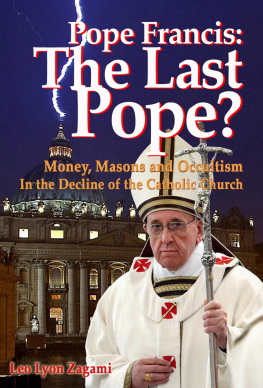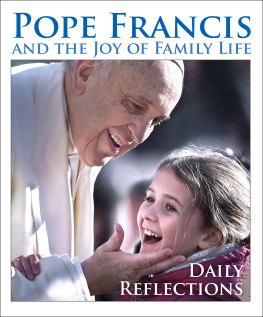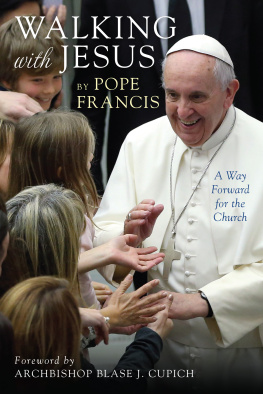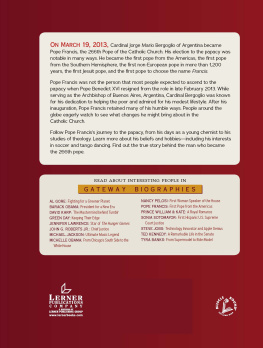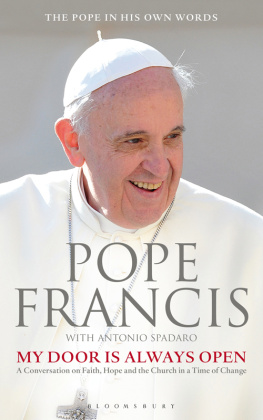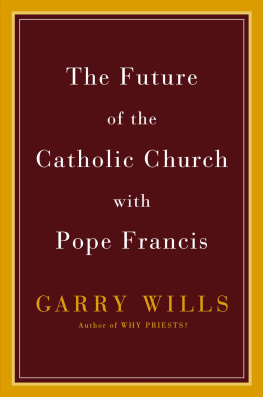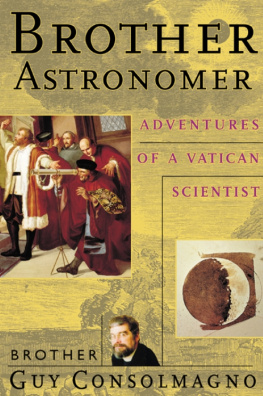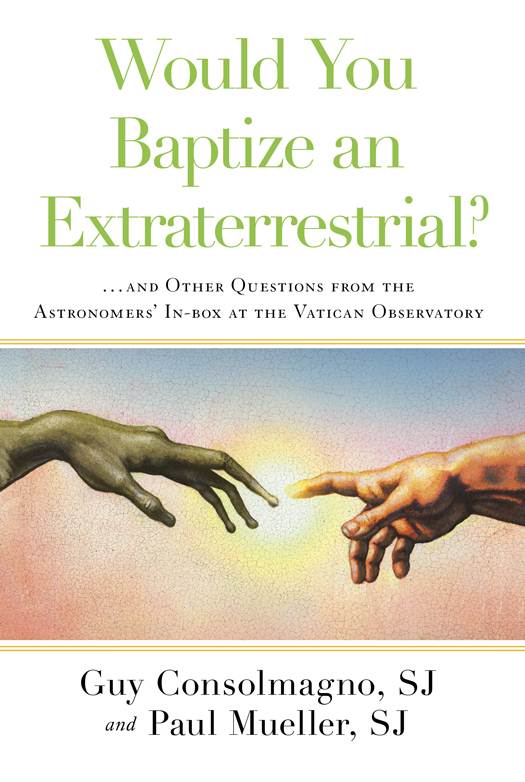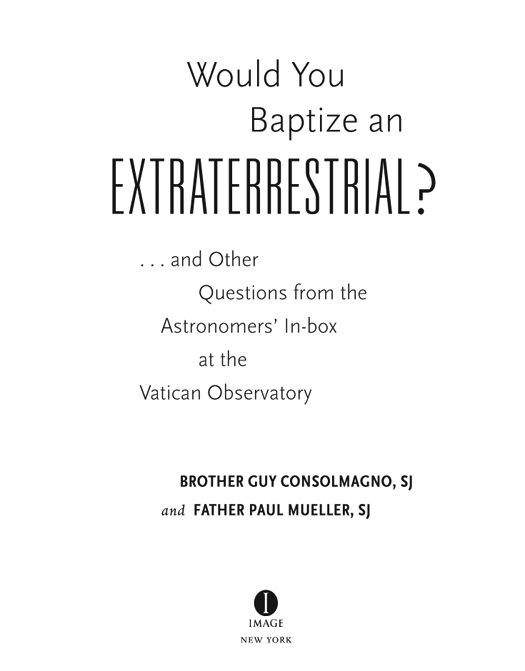ALSO BY GUY CONSOLMAGNO, SJ
The Heavens Proclaim: Astronomy and the Vatican
Gods Mechanics: How Scientists and Engineers Make Sense of Religion
Intelligent Life in the Universe? Catholic Belief and the Search for Extraterrestrial Intelligent Life
The Way to the Dwelling of Light: How Physics Illuminates Creation
Brother Astronomer: Adventures of a Vatican Scientist
Turn Left at Orion: Hundreds of Night Sky Objects to See in a Home Telescopeand How to Find Them with Dan M. Davis
Worlds Apart: A Textbook in Planetary Sciences with Martha W. Schaefer
Copyright 2014 by Br. Guy Consolmagno and Fr. Paul Mueller
All rights reserved.
Published in the United States by Image, an imprint of the Crown Publishing Group, a division of Random House LLC, a Penguin Random House Company, New York,
www.crownpublishing.com
IMAGE is a registered trademark and the I colophon is a trademark of Random House LLC.
Library of Congress Cataloging-in-Publication Data
Consolmagno, Guy, 1952
Would you baptize an extraterrestrial?: and other strange questions from the inbox at the Vatican Observatory / Brother Guy Consolmagno SJ and Father Paul Mueller SJ. First Edition.
pages cm
ISBN 978-0-8041-3695-2
1. Bible and scienceMiscellanea. 2. Religion and scienceMiscellanea. 3. Catholic ChurchDoctrinesMiscellanea.
4. Specola vaticanaMiscellanea. I. Title.
BS650.C67 2014
261.55dc23
2014033856
ISBN 978-0-8041-3695-2
eBook ISBN 978-0-8041-3696-9
Jacket design by Michael Nagin
Jacket illustration: Burkhardt Studio, Inc.
v3.1_r1
In memory of
Fr. Bill Stoeger, SJ
(19432014)
Contents
D AY 1: Biblical Genesis or Scientific Big Bang?
SETTING: THE ART INSTITUTE OF CHICAGO
D AY 2: What Happened to Poor Pluto?
SETTING: EAST ANTARCTIC ICE PLATEAU
D AY 3: What Really Happened to Galileo?
SETTING: THE TOWER OF THE WINDS, VATICAN CITY
D AY 4: What Was the Star of Bethlehem?
SETTING: VATICAN OBSERVATORY TELESCOPES ATOP THE PAPAL SUMMER PALACE, CASTEL GANDOLFO
D AY 5: Whats Going to Happen When the World Ends?
SETTING: DINING AT THE END OF THE UNIVERSE
D AY 6: Would You Baptize an Extraterrestrial?
SETTING: LOS ANGELES INTERNATIONAL AIRPORT, BRADLEY INTERNATIONAL TERMINAL
INTRODUCTION: The Dialogue Begins
GUY: Would you baptize an extraterrestrial?
That is one of the questions people ask us all the time here at the Vatican Observatory along with questions about the Star of Bethlehem, the beginning and end of the universe, Galileo, Pluto, black holes, killer asteroids, and all the other topics astronomers always get asked about.
What is it about questions of this sort that raises such interestand sometimes suspicion and fearamong so many people? Lets face it, most people know were not likely to be running into any ETs anytime soon; nor is the exact nature of the Star of Bethlehem essential to any catechism or creed. But people care. They keep asking us. Why?
This book is about whats behind those questions.
PAUL: And this book is about what its like when science encounters faith on friendly, mutually respectful terms.
Do you think we should reject any results of modern science that seem to disagree with the Bible? Do you think that the Bible has greater authority than science, and that biblical faith should always get the last word over science? If so, this might not be the book for you. (But read on!)
Do you think we should reject anything in the Bible that seems to be at odds with modern science? Do you think that science has greater authority than the Bible, and that science should always get the last word over biblical faith? If so, this might not be the book for you. (But read on!)
Do you think that both science and faith should be taken seriously, but you struggle with how to hold science and faith together, with integrity? Do you find yourself tending to keep science and faith isolated from each other, in separate, watertight compartments, but you wish that science and faith didnt have to take turns in your life? Then this book is for you. Read on!
GUY: The two of us writing this book are members of the research staff at the Vatican Observatory, the official astronomical research institute of the Catholic Church. Im a scientist; I specialize in planetary physics and geology and especially the study of asteroids and meteorites. Pauls area of expertise is the history and philosophy of scienceespecially that of physics and astronomy.
We are both Jesuits, which means that we are members of the Society of Jesus, the largest religious order in the Catholic Church. I am a Jesuit brother, and Pauls a Jesuit priest. When someone asks Paul or me whether wed baptize an extraterrestrial, we find ourselves stopping to think: should I answer from the perspective of a scientist, from the perspective of a philosopher, from the perspective of a Catholic priest or brotheror from the perspective of someone who is all those things at once and doesnt find any great conflict or contradiction in that?
PAUL: Our primary work is research. Most of our time is spent working in the lab, making observations, writing papers, and attending scientific conferences. So were in regular contact with our colleagues at other research institutes and universities.
But since most of us at the Vatican Observatory are Jesuit priests or brothers, we are also in frequent contact with members of the general publicpeople who have questions and comments about science and faith, people who want to tell us about some discovery theyve made or about some theory theyve devised. And also people who just want to talk. We get a lot of e-mail!
GUY: I have more than seven hundred such e-mails in my files from the last five years. Some of the messages are a bit off-the-wall. But all of them come from people who want to take science and faith seriously, and many of our correspondents are people having trouble figuring out how to hold the two together with integrity and consistency.
This book is structured around a half dozen particular questions weve been asked time and againquestions that are interesting in themselves but that also tend to presuppose a conflict of some sort between science and religion.
We start with the question of Genesis versus the Big Bang, and we discuss how science and religion can have different but complementary ways of looking at the same issue. Then we discuss how scientific theories and ideas change and evolve over timefor example, we describe what happened recently when astronomers debated the status of Pluto as a planet. And we ask how religion can or should respond when science evolves and changes. To see how that might workand what happened when it didnt work wellwe examine the case of Galileos encounter with the Church.
People of faith generally believe that God is somehow active in the world. We talk about how that can be, in a universe that seems to be regulated and governed by inexorable scientific laws. People of faith often believe that we are somehow important in Gods eyes. We discuss how that can be, in a universe that is vast and ancient beyond human imagining and that seems doomed to come to an inglorious end, eventually.


